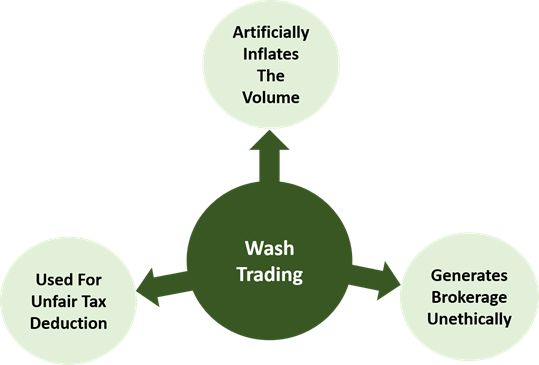Wash Trading
When it comes to the financial markets, many fraudulent activities and malpractices happen every now and then. These white-collar crimes are often so sophisticated that sometimes they even bypass the watchdog’s guard and only comes under the radar once the damage has been done. Some of the examples of these fraudulent activities are Insider trading, Pump and Dump schemes etc.
Wash trading is also one of these fraudulent activities that is treated as a criminal offence by many regulators across the world. The basic idea of Wash trading is to make frequent transactions with particular security in a short span of time which to carryout various illegal activities.

Kalkine Image
Wash trading generates fake volume on the listed security to lure in other investors. This artificial volume generation is done throgh a number of buying and selling transactions and is often used in Pump and Dump schemes. Wash trading is also used for unfair tax deductions on losses, and some unethical brokers also carry out Wash trading to generate more brokerage.
So how Wash trading is being conducted for fake volume generation and why volume is so important?
More often than not, investors and traders prefer to invest/trade in stocks that clock a high volume on a consistent basis. The high volume is generally associated with high-quality companies as an increased number of people, including big investors, High net worth individuals (HNIs), institutional investors etc. participate in these companies. Clearly, securities trading with higher volume attracts a higher number of people.
For the intraday traders, a high volume is generally one of the most important criteria as they need to get in and out within a single day with high volume. If the security poses lower volume or lacks liquidity, then the trader would face a high impact cost which is never preferred.
To increase the volume of trading for any security, more participation is needed from diverse set of investors; however, it is just what looks on the surface. Behind the complex world of financial markets, there are many ways to pump up the volume of the security artificially.
In the Wash trading, the trader places both the buy and the sell order for a specific security. This serves two purposes; first, the volume of the transaction gets counted on the exchange. Second, the trader also does not incur any loss on the trade as generally both the transactions are executed on the same price, or with a negligible difference.
This transaction creates an illusion of more transaction taking place in the security as the volume data is made public by the exchanges. However, nobody knows that it is single trader/entity that is generating the excess volume as an individual’s data is never put out publicly by the exchanges.
Let's look at an example to get the practical working of a Wash trade.
Suppose trader X holds 100 shares of XYZ company and somehow intends to lure in more investors to buy XYZ shares, he may start buying and selling XYX shares around the current market price of, let's say $10. Now, frequent buying and selling around $10 would keep on generating additional volume, which could become an eye candy for more investors.
How is Wash trading used to claim an unfair tax deduction?
Let's assume an investor X purchased 1000 shares of ABC at $10 per share. The investor sells the shares at $7 per share, making a net loss of $3,000 on his holding. Now, within a few days, the investor again purchases the same share with same quantity at $6 per share and sells them at $10 per share, making a profit of $4,000.
In the above case, the investor might attempt to claim a tax deduction on his initial $3,000 loss. This deduction would offset the tax liability that is due on the $4000 gain. This would allow the investor to pay less in taxes on his capital gain even though his holding never changed materially, which is unfair and illegal.
To counter this IRS (Internal Revenue Service) also has some regulations, to make the investor pay full tax liability on the entire gain on the next transaction, had the second transaction been made within 30 days of the first one.
How Brokers benefit from Wash trading?
Stockbrokers often come under the spotlight when unethical practices in the financial markets are talked about. However some handful unethical brokers have made a dent on the reputation of the brokerage business.
Almost all of the business of a brokerage firm comes from brokerage that is being generated on every transaction, irrespective of the client’s P&L. In order to maximize the brokerage some brokers also do wash trading from their client's account which effectively generates more brokerage.
The famous Libor (London Inter-bank Offered Rate) scandal also had traces of Wash trading. UBS traders colluded with the broker and paid compensation through a number of Wash trades for manipulating the LIBOR submission panels for the Japanese Yen.
The traders carried out a total of nine Wash trades and generated 170,000 pounds in fees for the brokers. This was a secret way to compensate for their services, which obviously couldn’t be paid openly.
Bottom line
Wash trades are being carried out since a long time for various purposes like fake volume generation, generation of excess brokerage or trying to claim an unfair tax deduction. However, the watchdogs are also aware of these fraudulent activities and authorities like IRS and SEC also have some regulations in place to counter these activities.
It is just one of the numerous white-collar ways in which the manipulations and malpractices in the financial markets take place. In case, any market participant comes across any of such activity should report to the respective authorities.
 Please wait processing your request...
Please wait processing your request...